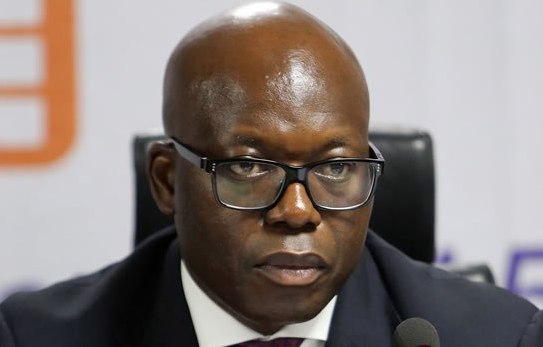Business
SEC Bars Tinubu, Five Directors of Oando from Public Company Positions

The Securities and Exchange Commission (SEC) on Friday barred the Group Chief Executive Officer of Oando Plc, Wale Tinubu, and his deputy, Omamofe Boyo, from holding director positions of public companies for a minimum five year period.
The Nigerian capital market regulator also directed other members of the Board of the company to resign their positions forthwith.
The SEC also directed the convening of an extraordinary general meeting of the company on or before July 1 to appoint new directors.
The directives were part of recommendations in the report of the panel constituted to investigate allegations of regulatory violations against the management of Oando Plc.
The sanctions are among some regulatory measures by the SEC to remedy the infractions by the sacked management of the company.
The investigation followed the receipt of two separate petitions from investors by the Commission in 2017, about alleged regulatory misconduct by the management of Oando Plc, which is listed on both the Nigerian and Johannesburg Stock Exchanges.
Apart from the panel that investigated certain infractions of securities and other relevant laws observed, SEC said it also engaged Deloitte & Touche to conduct a forensic audit of the activities of Oando Plc.
“The general public is hereby notified of the conclusion of the investigations of Oando Plc, SEC said in a statement on Friday by its spokesperson, Efe Ebelo.
“The findings from the report revealed serious infractions, such as false disclosures, market abuses, misstatements in financial statements, internal control failures, and corporate governance lapses stemming from poor board oversight, irregular approval of directors’ remuneration, unjustified disbursements to directors and management of the company, related party transactions not conducted at arm’s length, amongst others,” the statement said.
In addition to barring its directors from public companies, SEC said the company was also directed to pay monetary penalties.
Also, all indicted individuals, directors and affected Board members are to refund all improperly disbursed remuneration by the company.
Section 304 of the Investments and Securities Act, (ISA) 2007 empowers the Commission to refer all issues with possible criminality to the appropriate criminal prosecuting authorities.
In addition, the SEC said other aspects of the findings would be referred to the Nigerian Stock Exchange (NSE), Federal Inland Revenue Service (FIRS), and the Corporate Affairs Commission (CAC) for further actions.
“The Commission is confident that with the implementation of the above directives and introduction of some remedial measures, such unwholesome practices by public companies would be significantly reduced.
“Therefore, in line with the Federal Government’s resolve to build strong institutions, Boards of public companies are enjoined to properly perform their fiduciary duties as required under extant securities laws” the statement said.
The Commission said, as the apex regulator of the Nigerian capital market, it will maintain its zero tolerance to market infractions.
It reiterated its commitment to ensuring fairness, integrity, efficiency and transparency of the securities market, to strengthen investors protection.
Premium Times
Business
FirstBank Launches 500-Seater Bleacher at Carnival Calabar & Festival 2025

West Africa’s premier financial institution and financial inclusion services provider, FirstBank, has officially announced its sponsorship of the Carnival Calabar & Festival 2025, unveiling a landmark addition set to redefine the carnival experience — the first-ever private premium seating area at the event.
The highlight of FirstBank’s participation is the construction of a 500-seater premium bleacher, designed to provide comfort, safety, and an elevated viewing experience for carnival enthusiasts.
Speaking on the sponsorship, the Acting Group Head Marketing and Corporate Communications, FirstBank, Olayinka Ijabiyi, noted that the carnival aligns with the Bank’s First@Arts initiative, a platform dedicated to supporting the creative arts value chain across Nigeria. He said, “We recognise the transformative power of the arts, including carnivals, in inspiring people and strengthening national unity. For more than 131 years, we have supported platforms that promote self-expression, social reflection and cultural exchange. Our investment in the Carnival Calabar & Festival demonstrates our commitment to preserving the nation’s rich cultural heritage through First@Arts.”
“As part of our sponsorship this year, we are introducing the first-ever private 500-seater premium bleacher to further elevate the carnival experience. This exclusive seating is designed to provide exceptional comfort and an unforgettable viewing experience for attendees,” Ijabiyi added.
The Chairman of the Cross River State Carnival Calabar Commission, Gabe Onah, also commented on FirstBank’s sponsorship. “FirstBank’s involvement is a strong demonstration of private-sector support for culture and tourism. This partnership not only enhances the overall quality of the carnival but also strengthens its global appeal,” he said.
The Carnival Calabar & Festival 2025 is officially marketed by Okhma Global Limited, the appointed Official Marketer responsible for brand partnerships, promotional engagements, and ticket sales. Okhma Global Limited has partnered with the Cross River State government in delivering Carnival Calabar & Festival for over ten years, playing a key role in strengthening the carnival’s commercial growth and global visibility.
Business
Yuletide: Ecobank Urges Vigilance, Guarantees Seamless Banking

Ecobank Nigeria, a member of Africa’s leading pan-African banking group, has assured customers of uninterrupted access to banking services throughout the year-end holiday period via its secure and robust digital platforms. The Bank also urged customers to remain vigilant against fraud and scams during the festive season.
Speaking on the development, Victor Yalokwu, Head, Products & Analytics, Consumer & Commercial Banking, Ecobank Nigeria, said the Bank’s digital channels — including the Ecobank Mobile App, Ecobank Business App, USSD *326#, Ecobank Online, OmniPlus, Omnilite, EcobankPay, RapidTransfer, Ecobank Cards, ATMs, PoS terminals, and over 35,000 Ecobank Xpress Point (Agent Banking) locations nationwide — will remain fully available to support customers throughout the yuletide and year-end holiday period.
He noted that customers will continue to enjoy a wide range of services during the period, including local and international funds transfers, bill payments and airtime top-ups, merchant payments, balance inquiries and account statements, as well as cardless cash withdrawals via ATMs.
According to Yalokwu, “Ecobank encourages customers to leverage these digital solutions for safe, fast, and efficient banking, especially during the festive season when convenience and reliability are essential. While physical branch operations may be subject to adjusted working hours in line with public holidays, customers can be assured that Ecobank’s digital platforms are designed to deliver uninterrupted service and enhanced security at all times. Ecobank remains committed to providing innovative financial solutions and exceptional customer service, and we wish all our customers a joyful festive season and a prosperous New Year.”
Yalokwu also cautioned customers to remain vigilant against fraudsters and scammers during the period. “Before you wrap up the year, tighten your security. December brings online sales, travel, and year-end distractions—this is exactly when scammers are most active. From fake festive deals to cloned merchant sites and suspicious messages, staying vigilant helps keep your money safe.”
He advised customers to shop only on trusted websites, never share their PINs, passwords, or one-time passwords (OTPs), avoid banking on public Wi-Fi networks, be cautious of urgent or emotionally charged messages, and regularly review their account activity.
Business
Fidelity Bank Donates Hoses, Water Pumps to Fire Service

Fidelity Bank Plc has donated firefighting and preventive equipment, including hoses and gasoline-powered water pumps, to the Ikoyi Fire Service Station in Lagos, reinforcing efforts to improve emergency response and promote community safety.
The donation was executed under the Fidelity Helping Hands Programme (FHHP) by the bank’s True Serve team. Through the initiative, Fidelity Bank employees identify critical community needs, raise funds, and receive matching financial support from the bank to implement impact-driven projects.
Speaking on the initiative, Divisional Head, Brand and Communications Division at Fidelity Bank, Dr Meksley Nwagboh, said the intervention reflects the bank’s commitment to public safety, environmental protection, and sustainable community development.
“Community safety is a shared responsibility. Fidelity Bank remains committed to supporting initiatives that protect lives, property, and the environment,” Nwagboh said, adding that preventive measures remain more effective than emergency responses.
He noted that providing the right tools to first responders aligns with the bank’s broader goal of enabling people to live safe, meaningful, and empowered lives.
Lagos State Controller of the Federal Fire Service, Controller of Fire (CF) Funke Adebayo, commended Fidelity Bank for the timely support, particularly as the festive season approaches amid dry weather conditions that heighten fire risks.
She urged residents to remain vigilant and warned parents against allowing children to handle fireworks during celebrations, stressing that careless handling of fire could lead to avoidable disasters.
Adebayo also disclosed that the Fire Service has intensified sensitisation visits to corporate organisations to promote fire safety and discourage unsafe practices.
Also speaking, Area Commander, Onikan Fire Station, Chief Superintendent of Fire (CSF) Oswere Michael, expressed appreciation for the donation, noting that it would strengthen the station’s operational capacity.
He encouraged households, businesses, and community members to prioritise fire safety, describing collective responsibility as critical to preventing fire outbreaks.
Fidelity Bank Plc is a full-fledged commercial deposit money bank serving over 9.1 million customers through its digital platforms, 255 business offices across Nigeria, and its UK subsidiary, FidBank UK Limited. The bank has received multiple local and international awards in recognition of its performance in digital transformation, MSME banking, and innovative financial services.
Photo – L-R: Lagos State Controller, Federal Fire Service, CF (Controller of Fire), Adebayo Funke; Tolulope Rojaiye, Marketing Business Partner, Fidelity Bank Plc; Assistant Superintendent of Fire, Ishola Folorunsho Olufemi; and Station Commander, Onikan Fire Station, Lagos, Okeke Ferdinand; during the donation of firefighting equipment to the Federal Fire Service at Ikoyi, Lagos, recently.






